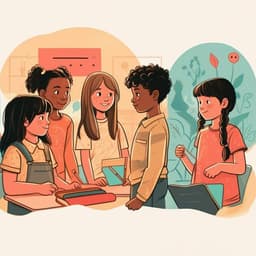
Education
Transforming the educational experiences of marginalized students in Ghana through dialogic literary gatherings
E. Allotey, R. García-carrión, et al.
Discover how dialogue-based Dialogic Literary Gatherings are changing the educational landscape for marginalized 8th-grade students in Southeastern Ghana. This innovative research by Eugenia Allotey, Rocío García-Carrión, Lourdes Villardón-Gallego, and Marta Soler-Gallart reveals transformative effects on student confidence, peer relationships, and overall educational experiences.
Related Publications
Explore these studies to deepen your understanding of the subject.







